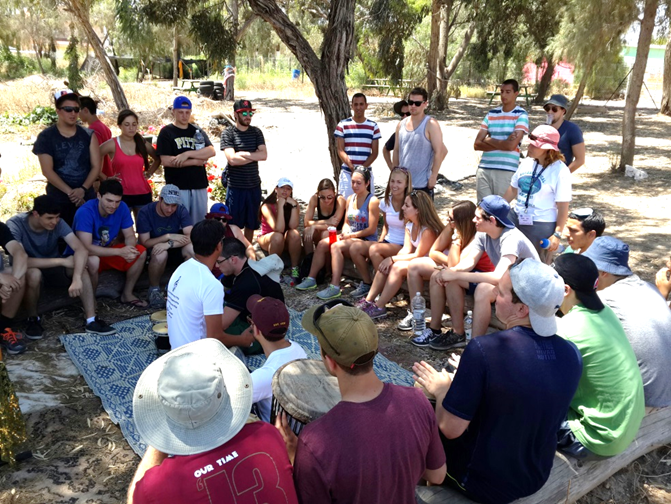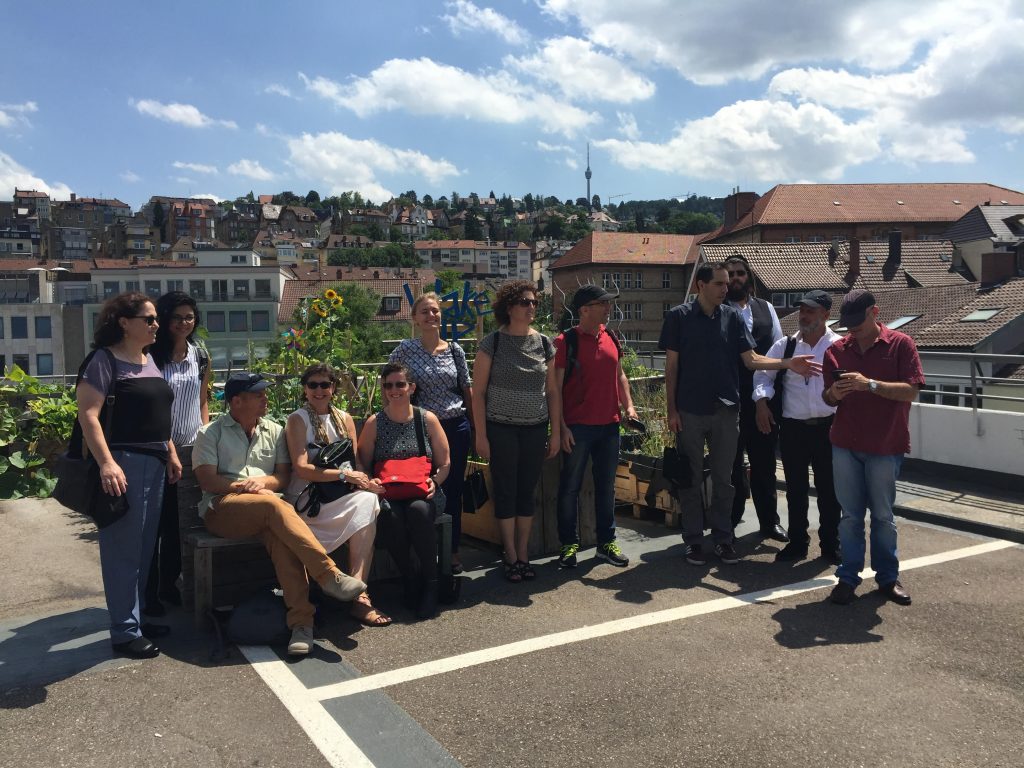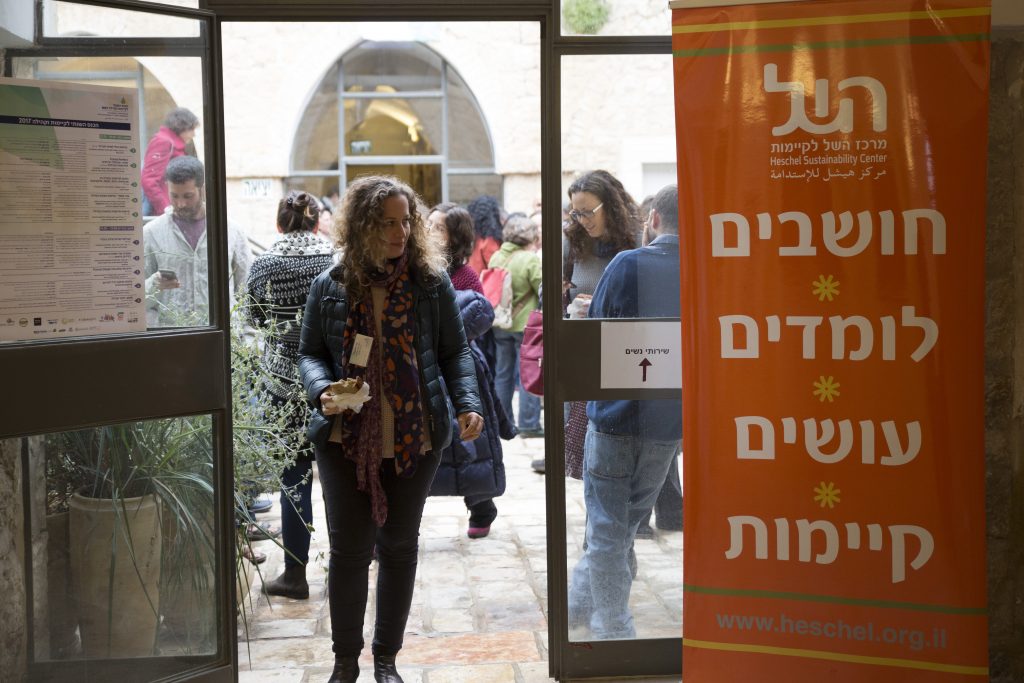Establishing the Center for Local Sustainability
By spearheading initiatives, creating models, building awareness and capabilities, and promoting legislation and policy, since its inception in 2006, the Heschel Center’s “Center for Local Sustainability” (CLS) has developed and promoted the entire field of local sustainability in Israel.
Its stated purpose is to “be the home for sustainable development issues at the local level for local authorities, local and regional councils, civil and business sectors.” Initiated by Dr. Orli Ronen, the CLS is a result of cooperation between the Heschel Center and the Ministry of Environmental Protection, the Porter School for Environmental Studies of Tel Aviv University and ICLEI. Its vision and program stems from a global movement, which was expressed in the Aalborg Convention as follows: “We are convinced that the city is the largest and most appropriate unit to deal with the imbalance that is affecting our world, and yet the smallest unit for a meaningful solution to the problems… We, cities and towns, recognize that existence is not a vision or a permanent state, but a creative process, local, seeking balance and penetrating all levels of decision-making” (Aalborg, Denmark, 1994)

In light of this belief, the CLS has created basic definitions and standards for sustainability that range from the level of the sustainable neighborhood (in places such as Bitzaron and Ramat Israel in Tel Aviv and Beit Hakerem and Kiryat Yovel in Jerusalem), to the sustainable city and local authority, whether local, urban, or regional. These definitions and standards include a blueprint for a strategic plan, and the ten basic principles for becoming a sustainable public authority.
Since its inception, the CLS has provided services such as: training for local activists (RiKMA), support for the development of master plans for sustainable development for local/regional councils (in cooperation with the Regional Councils Center, the Ministry of Agriculture, The Interior Ministry and the Ministry of Education), workshops on “Placemaking,” and for the past nine years, a strategic planning for sustainability course in local authorities.
The Center’s website contains many examples from Israel and the world, including nearby sources of inspiration like the excellent initiatives in Kfar Saba and the Local Sustainability Center in Be’er Sheva. In addition, the CLS initiates and supports professional networks such as the sustainability directors’ forum, an inter-sector collaborative learning forum, a network for Fellowship alumni and service-providing professionals, etc.
One of the largest projects in which the Center has been involved is an ENPI CBCMed, a European Union funding program with Shatil, providing the content for the Local Sustainable Economy project in the Negev. The Project involved developing the content and running a pilot project on the Negev as a region with the goal to ensuring economic independence for these peripheral communities. The project focused on local hiring, empowering local businesses and a private-public partnership. The project had been a collaboration with two more Mediterranean countries – Italy and Portugal.
The Network of Local Sustainability Centers
The Heschel Center has been involved in the creation of the Local Sustainability Centers Network,
generously supported by the Shahaf, Gandyr and Beracha foundations and in partnership with the Ministry of Environmental Protection.
The Centers, operating out of a building or an office in each of the peripheral towns, worked to instill a sustainable lifestyle in households of residents and to promote local processes. In recent years, the CLS has promoted an innovative model in which it operates out of a building or office in each locale, which serves as a Local Sustainability Center, working to instill a sustainable lifestyle in households of residents and to promote local processes. Local sustainability centers now exist in dozens of communities around the country.
The 12 original centers were established in cooperation with the Shachaf Foundation, the Gandyr Foundation, the Jewish Agency and the network of intentional communities in the periphery of Israel: Yokneam, Pardes Hanna, Beit Shemesh, Gilo, Kiryat Gat, Segev Shalom, Netivot, Migdal HaEmek and Sderot.

Each center has a physical structure and a coordinator who is responsible for conducting activities and community involvement, while demonstrating a sustainable way of life and encouraging residents to participate in the planning and sustainable design of the common public spaces in their locale. The network of centers was coordinated by the Heschel Center from 2013−2018, with an emphasis on improving local lifestyles and promoting values of urban democracy, urban renewal, innovative initiatives, residents ownership of the public space and inter-sectoral partnership. Today there are many sustainability centers, in places such as Ashdod, Gan Yavneh, Kiryat Gat, Tel Aviv, Kfar Saba, Beit She’an, the Jordan Valley, Misgav, Hadar in Haifa, and in the towns of the Beit Netufah Towns Association in the center of the Galilee. Another issue that is prominently addressed by the Center for Local Sustainability is a training program for local authorities in their efforts to leverage sustainability as an organizational strategy.
One of the focal points of this activity was the development of partnerships between commercial and government sectors, in cooperation with the Public Private Partnership organization.

The goal of these partnerships was to reach an agreement that defines a common value base for the local authority and local businesses, based on broad sustainability that integrates society, the economy and the environment, and includes a variety of subjects that are important to the commercial sector: prosperous businesses and local employment, workers’ rights, sustainable economic practice, energy efficiency, etc. The Heschel Center promoted this inter-sectoral partnership by sending a delegation of 14 participants, representing local authorities, local businesses and social justice organizations, to three cities in Germany, where they learned how the local authorities support and create opportunities for local businesses, foster inter-sectoral partnerships and promote a sustainable agenda within the local authority.
The Center has also passed important policy initiatives, such as the reduction of greenhouse gas emissions in the local authorities (the Forum 15 Climate Convention, and the Environmental Committee in Local Authorities, which obliges each authority to appoint a committee to oversee environmental matters in the town, composed of representatives of the council, professionals, and representatives of environmental organizations.
In 2017, the Center ran its first Sustainability in the Community Conference, bringing municipalities, community activists and local businesses to share success stories about urban sustainability. The first conference hosted Puran Desai, founder of “Bio-Regional” and the concept of 10 channels for sustainable living, which was adopted by the Heschel Center to serve as the basis for its work with municipalities. Since then, the Center has run the Sustainability and Community Conference every year, in collaboration with the Municipality of Jerusalem and other partners.
Lately the center has been running workshops, capacity building and consulting for many municipalities in Israel.
The success of the CLS received official recognition when, in 2008, it was declared the winner of the environmental movement’s “Green Globe” award for its achievements in local sustainability.

